IT Ethics: Apps and Privacy: An Ethical Case Study and Analysis
VerifiedAdded on 2022/09/16
|10
|2295
|25
Report
AI Summary
This report presents an ethical analysis of a case study involving the social networking application Path, focusing on its data collection practices and subsequent privacy issues. The report investigates whether Path's actions, specifically the collection and storage of user contact information without explicit consent, were ethically justifiable. It employs four classical ethical theories—utilitarianism, deontology, contract theory, and virtue ethics—to evaluate the case. The analysis reveals that the app's practices were unethical under all four frameworks, highlighting concerns about user privacy and the potential for misuse of personal data. The report concludes with recommendations for improving transparency and obtaining user consent before collecting any data, emphasizing the importance of ethical considerations in the design and operation of mobile applications. The report argues that the developers should have been more careful about user's privacy and security.
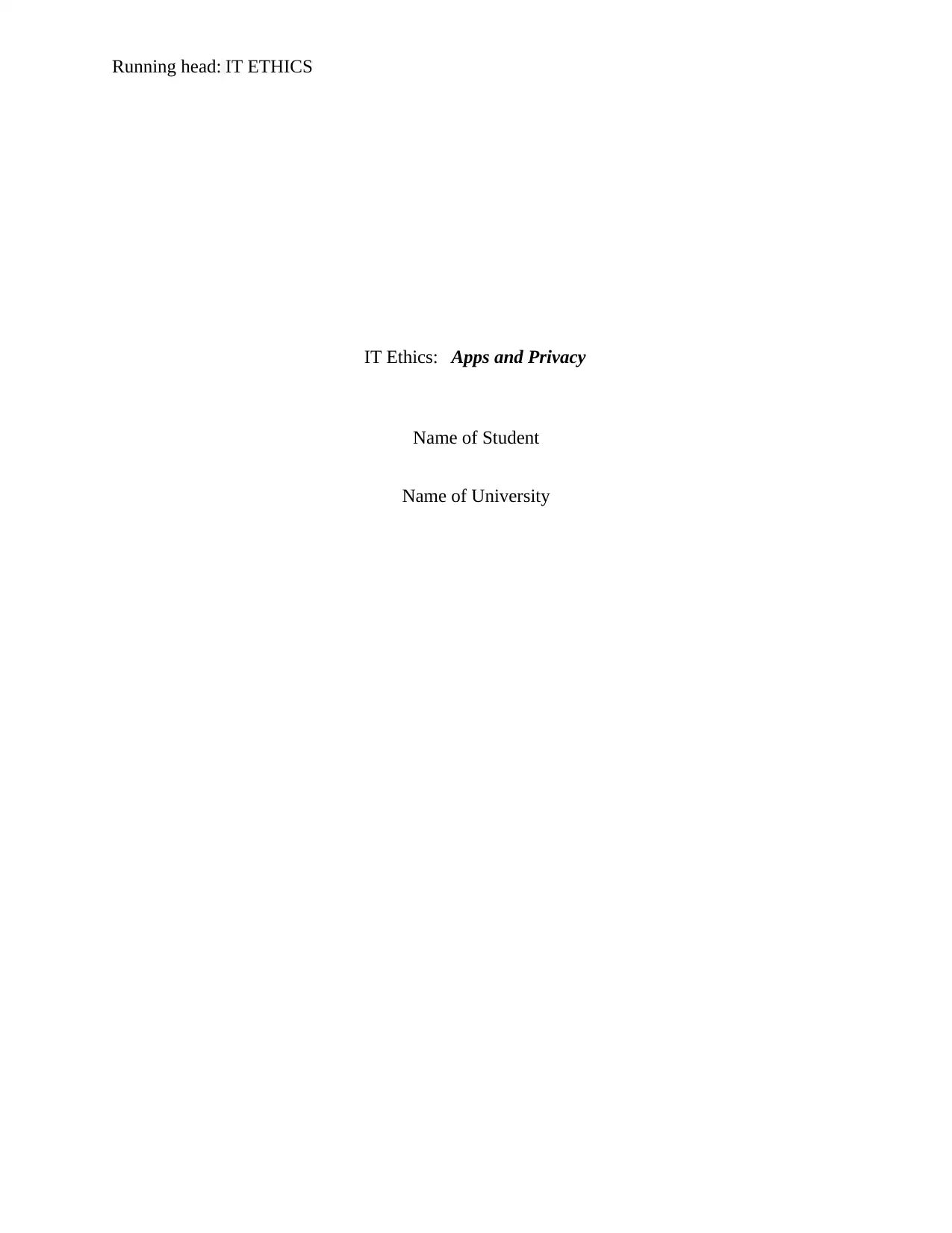
Running head: IT ETHICS
IT Ethics: Apps and Privacy
Name of Student
Name of University
IT Ethics: Apps and Privacy
Name of Student
Name of University
Paraphrase This Document
Need a fresh take? Get an instant paraphrase of this document with our AI Paraphraser
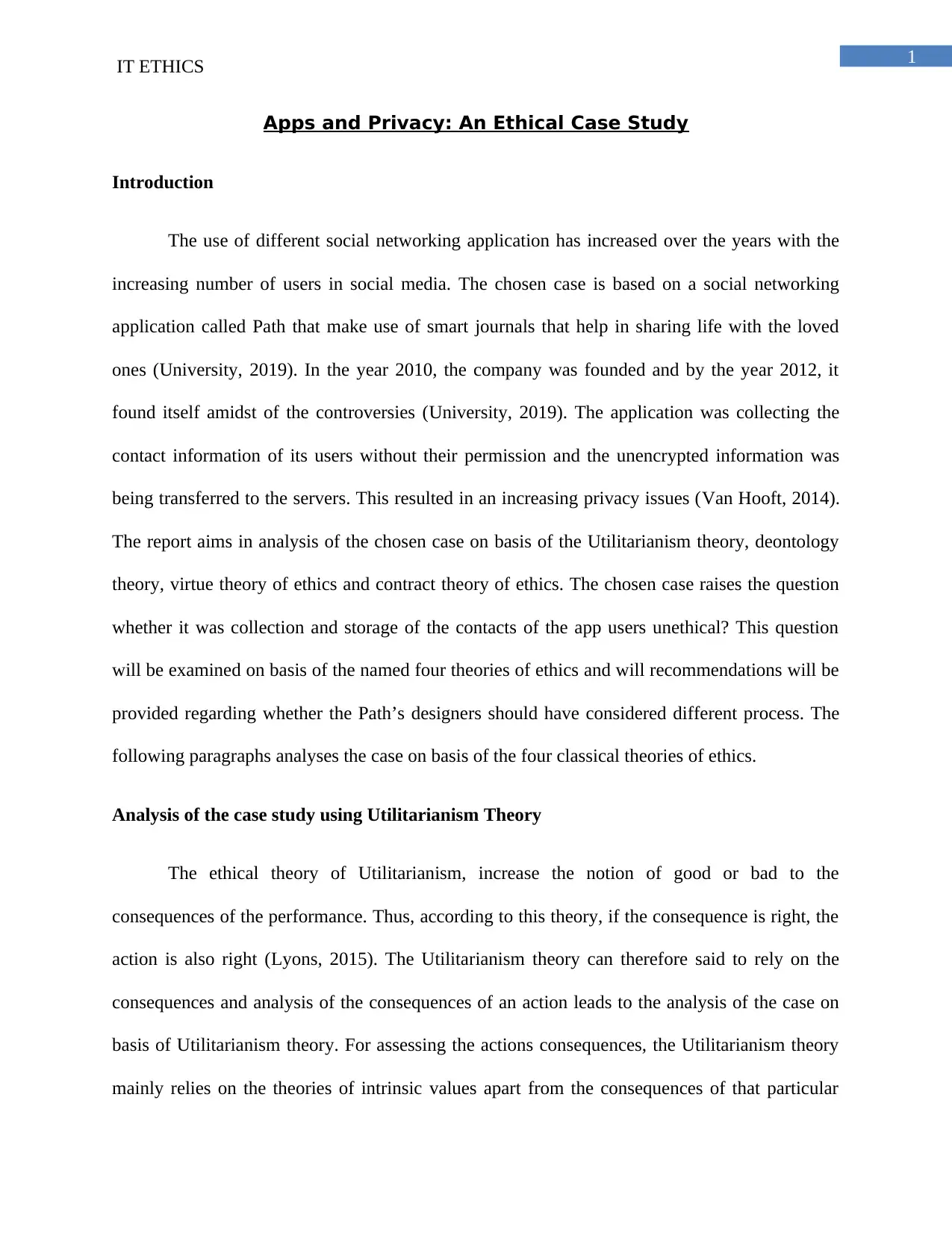
1
IT ETHICS
Apps and Privacy: An Ethical Case Study
Introduction
The use of different social networking application has increased over the years with the
increasing number of users in social media. The chosen case is based on a social networking
application called Path that make use of smart journals that help in sharing life with the loved
ones (University, 2019). In the year 2010, the company was founded and by the year 2012, it
found itself amidst of the controversies (University, 2019). The application was collecting the
contact information of its users without their permission and the unencrypted information was
being transferred to the servers. This resulted in an increasing privacy issues (Van Hooft, 2014).
The report aims in analysis of the chosen case on basis of the Utilitarianism theory, deontology
theory, virtue theory of ethics and contract theory of ethics. The chosen case raises the question
whether it was collection and storage of the contacts of the app users unethical? This question
will be examined on basis of the named four theories of ethics and will recommendations will be
provided regarding whether the Path’s designers should have considered different process. The
following paragraphs analyses the case on basis of the four classical theories of ethics.
Analysis of the case study using Utilitarianism Theory
The ethical theory of Utilitarianism, increase the notion of good or bad to the
consequences of the performance. Thus, according to this theory, if the consequence is right, the
action is also right (Lyons, 2015). The Utilitarianism theory can therefore said to rely on the
consequences and analysis of the consequences of an action leads to the analysis of the case on
basis of Utilitarianism theory. For assessing the actions consequences, the Utilitarianism theory
mainly relies on the theories of intrinsic values apart from the consequences of that particular
IT ETHICS
Apps and Privacy: An Ethical Case Study
Introduction
The use of different social networking application has increased over the years with the
increasing number of users in social media. The chosen case is based on a social networking
application called Path that make use of smart journals that help in sharing life with the loved
ones (University, 2019). In the year 2010, the company was founded and by the year 2012, it
found itself amidst of the controversies (University, 2019). The application was collecting the
contact information of its users without their permission and the unencrypted information was
being transferred to the servers. This resulted in an increasing privacy issues (Van Hooft, 2014).
The report aims in analysis of the chosen case on basis of the Utilitarianism theory, deontology
theory, virtue theory of ethics and contract theory of ethics. The chosen case raises the question
whether it was collection and storage of the contacts of the app users unethical? This question
will be examined on basis of the named four theories of ethics and will recommendations will be
provided regarding whether the Path’s designers should have considered different process. The
following paragraphs analyses the case on basis of the four classical theories of ethics.
Analysis of the case study using Utilitarianism Theory
The ethical theory of Utilitarianism, increase the notion of good or bad to the
consequences of the performance. Thus, according to this theory, if the consequence is right, the
action is also right (Lyons, 2015). The Utilitarianism theory can therefore said to rely on the
consequences and analysis of the consequences of an action leads to the analysis of the case on
basis of Utilitarianism theory. For assessing the actions consequences, the Utilitarianism theory
mainly relies on the theories of intrinsic values apart from the consequences of that particular
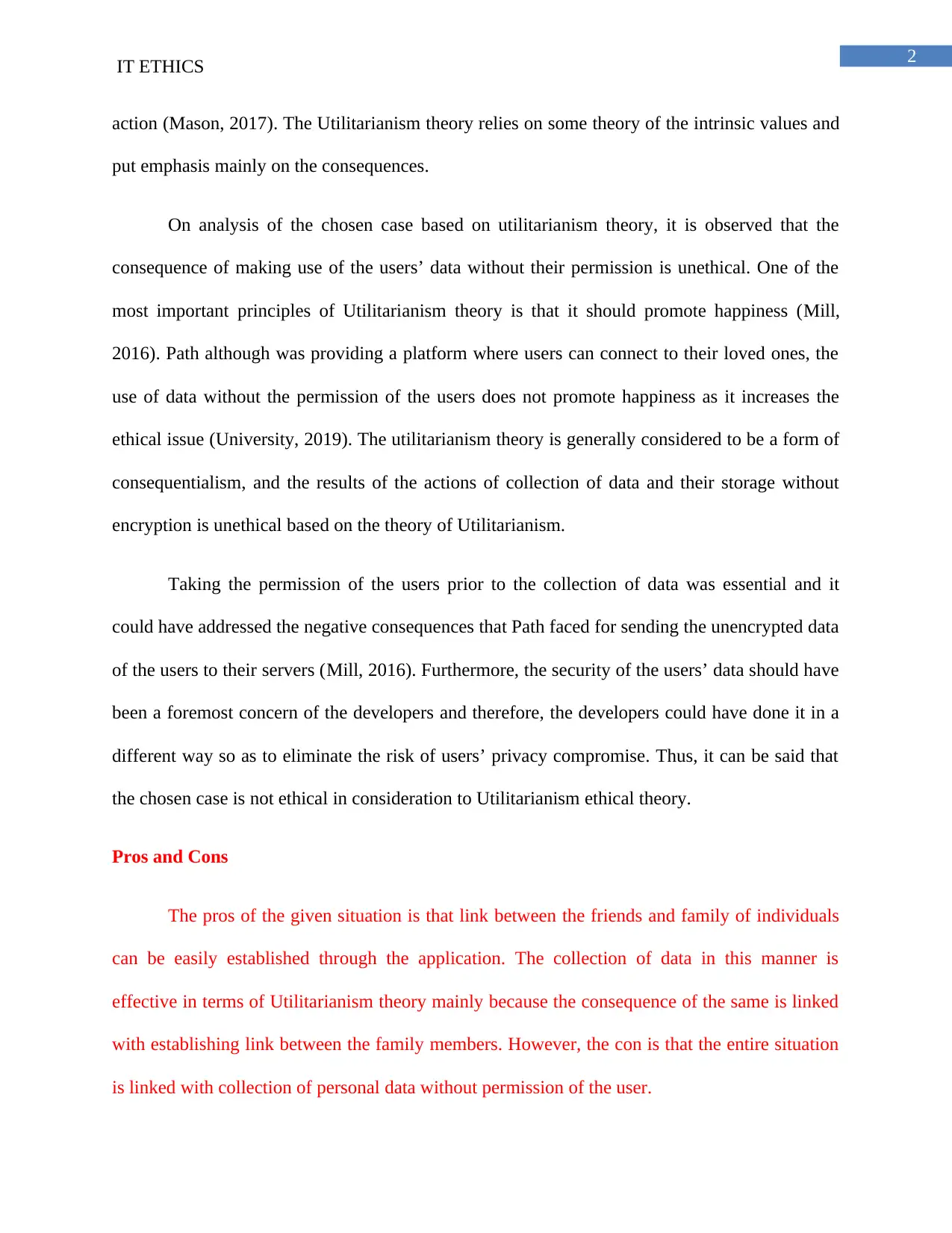
2
IT ETHICS
action (Mason, 2017). The Utilitarianism theory relies on some theory of the intrinsic values and
put emphasis mainly on the consequences.
On analysis of the chosen case based on utilitarianism theory, it is observed that the
consequence of making use of the users’ data without their permission is unethical. One of the
most important principles of Utilitarianism theory is that it should promote happiness (Mill,
2016). Path although was providing a platform where users can connect to their loved ones, the
use of data without the permission of the users does not promote happiness as it increases the
ethical issue (University, 2019). The utilitarianism theory is generally considered to be a form of
consequentialism, and the results of the actions of collection of data and their storage without
encryption is unethical based on the theory of Utilitarianism.
Taking the permission of the users prior to the collection of data was essential and it
could have addressed the negative consequences that Path faced for sending the unencrypted data
of the users to their servers (Mill, 2016). Furthermore, the security of the users’ data should have
been a foremost concern of the developers and therefore, the developers could have done it in a
different way so as to eliminate the risk of users’ privacy compromise. Thus, it can be said that
the chosen case is not ethical in consideration to Utilitarianism ethical theory.
Pros and Cons
The pros of the given situation is that link between the friends and family of individuals
can be easily established through the application. The collection of data in this manner is
effective in terms of Utilitarianism theory mainly because the consequence of the same is linked
with establishing link between the family members. However, the con is that the entire situation
is linked with collection of personal data without permission of the user.
IT ETHICS
action (Mason, 2017). The Utilitarianism theory relies on some theory of the intrinsic values and
put emphasis mainly on the consequences.
On analysis of the chosen case based on utilitarianism theory, it is observed that the
consequence of making use of the users’ data without their permission is unethical. One of the
most important principles of Utilitarianism theory is that it should promote happiness (Mill,
2016). Path although was providing a platform where users can connect to their loved ones, the
use of data without the permission of the users does not promote happiness as it increases the
ethical issue (University, 2019). The utilitarianism theory is generally considered to be a form of
consequentialism, and the results of the actions of collection of data and their storage without
encryption is unethical based on the theory of Utilitarianism.
Taking the permission of the users prior to the collection of data was essential and it
could have addressed the negative consequences that Path faced for sending the unencrypted data
of the users to their servers (Mill, 2016). Furthermore, the security of the users’ data should have
been a foremost concern of the developers and therefore, the developers could have done it in a
different way so as to eliminate the risk of users’ privacy compromise. Thus, it can be said that
the chosen case is not ethical in consideration to Utilitarianism ethical theory.
Pros and Cons
The pros of the given situation is that link between the friends and family of individuals
can be easily established through the application. The collection of data in this manner is
effective in terms of Utilitarianism theory mainly because the consequence of the same is linked
with establishing link between the family members. However, the con is that the entire situation
is linked with collection of personal data without permission of the user.
⊘ This is a preview!⊘
Do you want full access?
Subscribe today to unlock all pages.

Trusted by 1+ million students worldwide
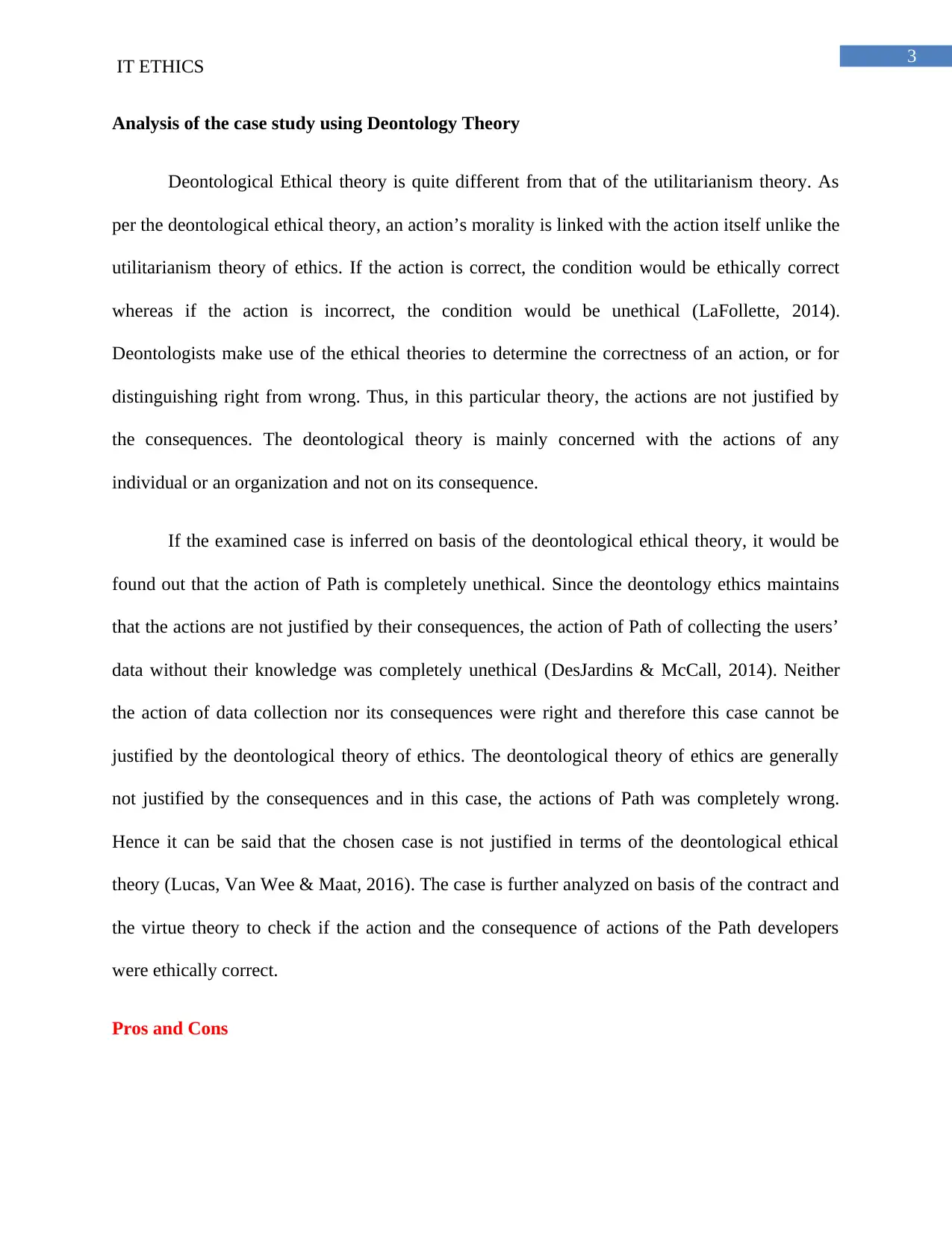
3
IT ETHICS
Analysis of the case study using Deontology Theory
Deontological Ethical theory is quite different from that of the utilitarianism theory. As
per the deontological ethical theory, an action’s morality is linked with the action itself unlike the
utilitarianism theory of ethics. If the action is correct, the condition would be ethically correct
whereas if the action is incorrect, the condition would be unethical (LaFollette, 2014).
Deontologists make use of the ethical theories to determine the correctness of an action, or for
distinguishing right from wrong. Thus, in this particular theory, the actions are not justified by
the consequences. The deontological theory is mainly concerned with the actions of any
individual or an organization and not on its consequence.
If the examined case is inferred on basis of the deontological ethical theory, it would be
found out that the action of Path is completely unethical. Since the deontology ethics maintains
that the actions are not justified by their consequences, the action of Path of collecting the users’
data without their knowledge was completely unethical (DesJardins & McCall, 2014). Neither
the action of data collection nor its consequences were right and therefore this case cannot be
justified by the deontological theory of ethics. The deontological theory of ethics are generally
not justified by the consequences and in this case, the actions of Path was completely wrong.
Hence it can be said that the chosen case is not justified in terms of the deontological ethical
theory (Lucas, Van Wee & Maat, 2016). The case is further analyzed on basis of the contract and
the virtue theory to check if the action and the consequence of actions of the Path developers
were ethically correct.
Pros and Cons
IT ETHICS
Analysis of the case study using Deontology Theory
Deontological Ethical theory is quite different from that of the utilitarianism theory. As
per the deontological ethical theory, an action’s morality is linked with the action itself unlike the
utilitarianism theory of ethics. If the action is correct, the condition would be ethically correct
whereas if the action is incorrect, the condition would be unethical (LaFollette, 2014).
Deontologists make use of the ethical theories to determine the correctness of an action, or for
distinguishing right from wrong. Thus, in this particular theory, the actions are not justified by
the consequences. The deontological theory is mainly concerned with the actions of any
individual or an organization and not on its consequence.
If the examined case is inferred on basis of the deontological ethical theory, it would be
found out that the action of Path is completely unethical. Since the deontology ethics maintains
that the actions are not justified by their consequences, the action of Path of collecting the users’
data without their knowledge was completely unethical (DesJardins & McCall, 2014). Neither
the action of data collection nor its consequences were right and therefore this case cannot be
justified by the deontological theory of ethics. The deontological theory of ethics are generally
not justified by the consequences and in this case, the actions of Path was completely wrong.
Hence it can be said that the chosen case is not justified in terms of the deontological ethical
theory (Lucas, Van Wee & Maat, 2016). The case is further analyzed on basis of the contract and
the virtue theory to check if the action and the consequence of actions of the Path developers
were ethically correct.
Pros and Cons
Paraphrase This Document
Need a fresh take? Get an instant paraphrase of this document with our AI Paraphraser
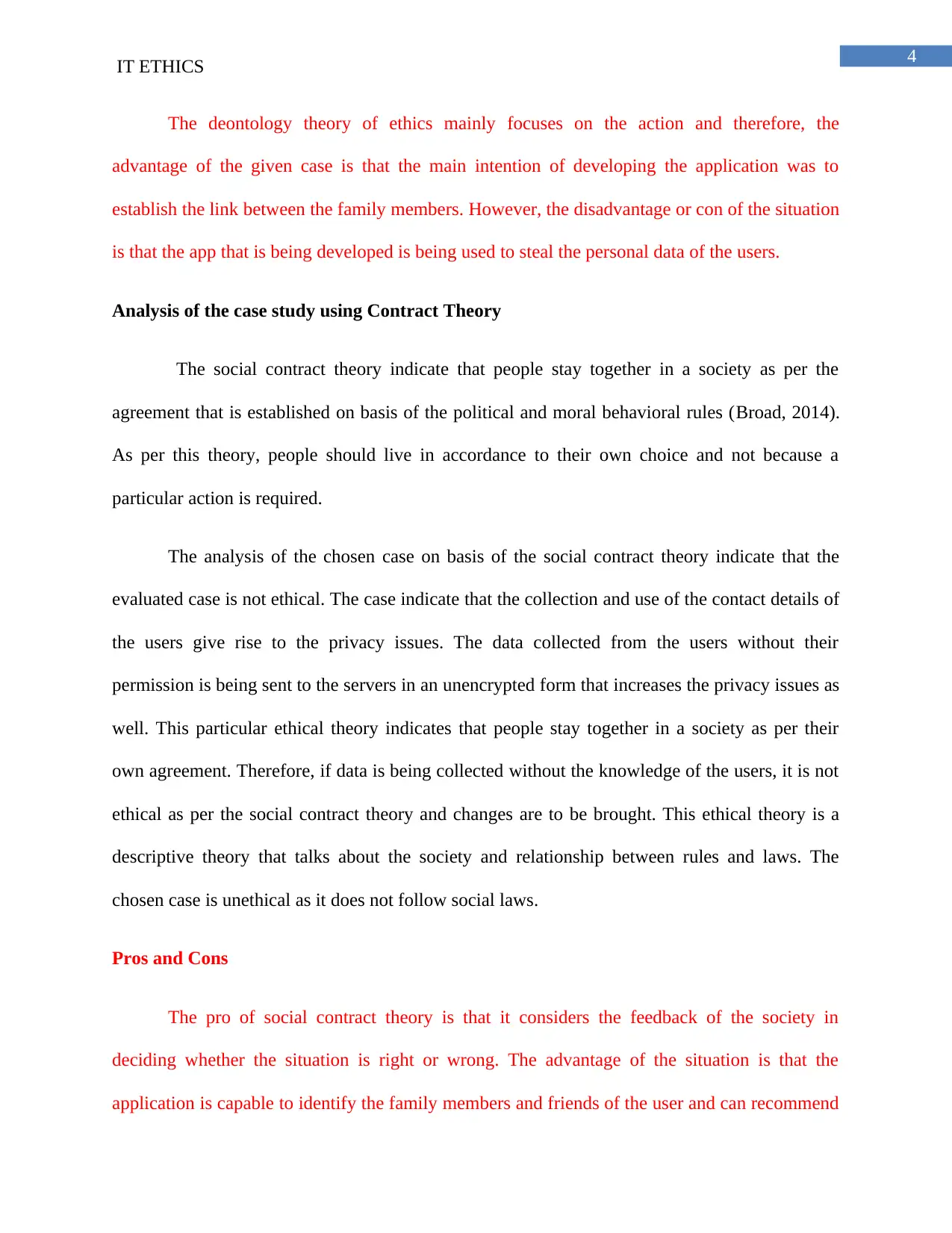
4
IT ETHICS
The deontology theory of ethics mainly focuses on the action and therefore, the
advantage of the given case is that the main intention of developing the application was to
establish the link between the family members. However, the disadvantage or con of the situation
is that the app that is being developed is being used to steal the personal data of the users.
Analysis of the case study using Contract Theory
The social contract theory indicate that people stay together in a society as per the
agreement that is established on basis of the political and moral behavioral rules (Broad, 2014).
As per this theory, people should live in accordance to their own choice and not because a
particular action is required.
The analysis of the chosen case on basis of the social contract theory indicate that the
evaluated case is not ethical. The case indicate that the collection and use of the contact details of
the users give rise to the privacy issues. The data collected from the users without their
permission is being sent to the servers in an unencrypted form that increases the privacy issues as
well. This particular ethical theory indicates that people stay together in a society as per their
own agreement. Therefore, if data is being collected without the knowledge of the users, it is not
ethical as per the social contract theory and changes are to be brought. This ethical theory is a
descriptive theory that talks about the society and relationship between rules and laws. The
chosen case is unethical as it does not follow social laws.
Pros and Cons
The pro of social contract theory is that it considers the feedback of the society in
deciding whether the situation is right or wrong. The advantage of the situation is that the
application is capable to identify the family members and friends of the user and can recommend
IT ETHICS
The deontology theory of ethics mainly focuses on the action and therefore, the
advantage of the given case is that the main intention of developing the application was to
establish the link between the family members. However, the disadvantage or con of the situation
is that the app that is being developed is being used to steal the personal data of the users.
Analysis of the case study using Contract Theory
The social contract theory indicate that people stay together in a society as per the
agreement that is established on basis of the political and moral behavioral rules (Broad, 2014).
As per this theory, people should live in accordance to their own choice and not because a
particular action is required.
The analysis of the chosen case on basis of the social contract theory indicate that the
evaluated case is not ethical. The case indicate that the collection and use of the contact details of
the users give rise to the privacy issues. The data collected from the users without their
permission is being sent to the servers in an unencrypted form that increases the privacy issues as
well. This particular ethical theory indicates that people stay together in a society as per their
own agreement. Therefore, if data is being collected without the knowledge of the users, it is not
ethical as per the social contract theory and changes are to be brought. This ethical theory is a
descriptive theory that talks about the society and relationship between rules and laws. The
chosen case is unethical as it does not follow social laws.
Pros and Cons
The pro of social contract theory is that it considers the feedback of the society in
deciding whether the situation is right or wrong. The advantage of the situation is that the
application is capable to identify the family members and friends of the user and can recommend
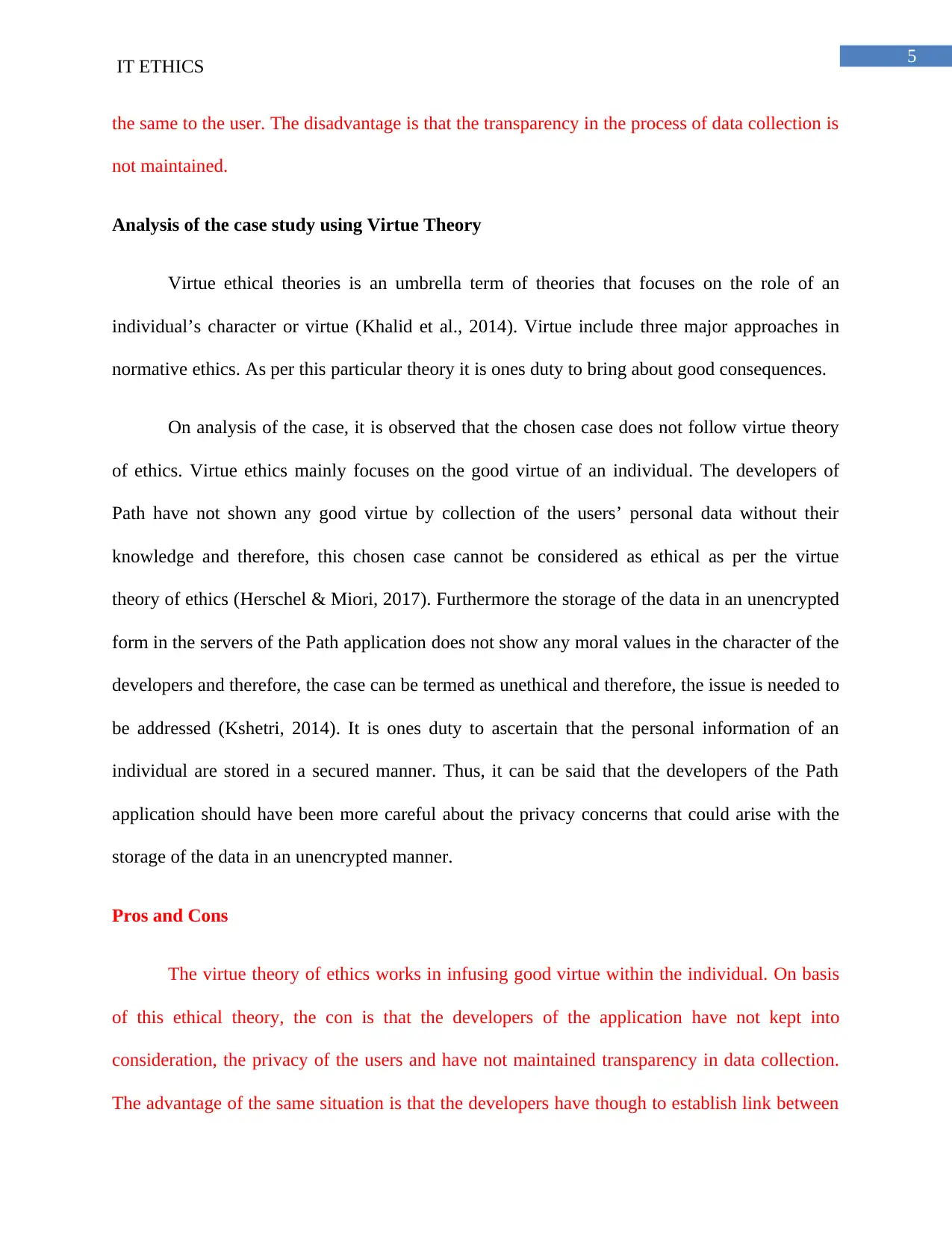
5
IT ETHICS
the same to the user. The disadvantage is that the transparency in the process of data collection is
not maintained.
Analysis of the case study using Virtue Theory
Virtue ethical theories is an umbrella term of theories that focuses on the role of an
individual’s character or virtue (Khalid et al., 2014). Virtue include three major approaches in
normative ethics. As per this particular theory it is ones duty to bring about good consequences.
On analysis of the case, it is observed that the chosen case does not follow virtue theory
of ethics. Virtue ethics mainly focuses on the good virtue of an individual. The developers of
Path have not shown any good virtue by collection of the users’ personal data without their
knowledge and therefore, this chosen case cannot be considered as ethical as per the virtue
theory of ethics (Herschel & Miori, 2017). Furthermore the storage of the data in an unencrypted
form in the servers of the Path application does not show any moral values in the character of the
developers and therefore, the case can be termed as unethical and therefore, the issue is needed to
be addressed (Kshetri, 2014). It is ones duty to ascertain that the personal information of an
individual are stored in a secured manner. Thus, it can be said that the developers of the Path
application should have been more careful about the privacy concerns that could arise with the
storage of the data in an unencrypted manner.
Pros and Cons
The virtue theory of ethics works in infusing good virtue within the individual. On basis
of this ethical theory, the con is that the developers of the application have not kept into
consideration, the privacy of the users and have not maintained transparency in data collection.
The advantage of the same situation is that the developers have though to establish link between
IT ETHICS
the same to the user. The disadvantage is that the transparency in the process of data collection is
not maintained.
Analysis of the case study using Virtue Theory
Virtue ethical theories is an umbrella term of theories that focuses on the role of an
individual’s character or virtue (Khalid et al., 2014). Virtue include three major approaches in
normative ethics. As per this particular theory it is ones duty to bring about good consequences.
On analysis of the case, it is observed that the chosen case does not follow virtue theory
of ethics. Virtue ethics mainly focuses on the good virtue of an individual. The developers of
Path have not shown any good virtue by collection of the users’ personal data without their
knowledge and therefore, this chosen case cannot be considered as ethical as per the virtue
theory of ethics (Herschel & Miori, 2017). Furthermore the storage of the data in an unencrypted
form in the servers of the Path application does not show any moral values in the character of the
developers and therefore, the case can be termed as unethical and therefore, the issue is needed to
be addressed (Kshetri, 2014). It is ones duty to ascertain that the personal information of an
individual are stored in a secured manner. Thus, it can be said that the developers of the Path
application should have been more careful about the privacy concerns that could arise with the
storage of the data in an unencrypted manner.
Pros and Cons
The virtue theory of ethics works in infusing good virtue within the individual. On basis
of this ethical theory, the con is that the developers of the application have not kept into
consideration, the privacy of the users and have not maintained transparency in data collection.
The advantage of the same situation is that the developers have though to establish link between
⊘ This is a preview!⊘
Do you want full access?
Subscribe today to unlock all pages.

Trusted by 1+ million students worldwide

6
IT ETHICS
the friends and family members with a single click by providing them with tailored
recommendation.
IT ETHICS
the friends and family members with a single click by providing them with tailored
recommendation.
Paraphrase This Document
Need a fresh take? Get an instant paraphrase of this document with our AI Paraphraser
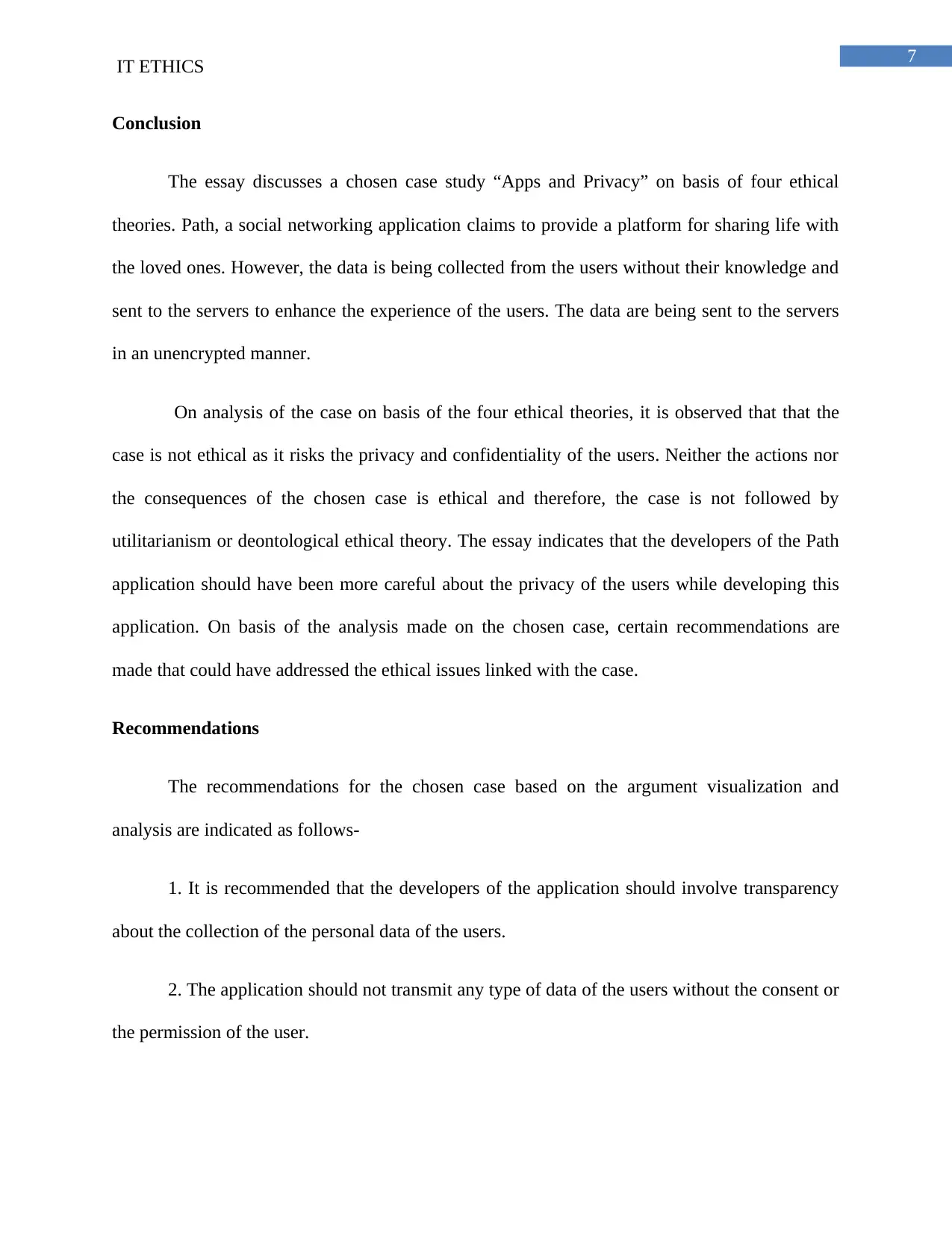
7
IT ETHICS
Conclusion
The essay discusses a chosen case study “Apps and Privacy” on basis of four ethical
theories. Path, a social networking application claims to provide a platform for sharing life with
the loved ones. However, the data is being collected from the users without their knowledge and
sent to the servers to enhance the experience of the users. The data are being sent to the servers
in an unencrypted manner.
On analysis of the case on basis of the four ethical theories, it is observed that that the
case is not ethical as it risks the privacy and confidentiality of the users. Neither the actions nor
the consequences of the chosen case is ethical and therefore, the case is not followed by
utilitarianism or deontological ethical theory. The essay indicates that the developers of the Path
application should have been more careful about the privacy of the users while developing this
application. On basis of the analysis made on the chosen case, certain recommendations are
made that could have addressed the ethical issues linked with the case.
Recommendations
The recommendations for the chosen case based on the argument visualization and
analysis are indicated as follows-
1. It is recommended that the developers of the application should involve transparency
about the collection of the personal data of the users.
2. The application should not transmit any type of data of the users without the consent or
the permission of the user.
IT ETHICS
Conclusion
The essay discusses a chosen case study “Apps and Privacy” on basis of four ethical
theories. Path, a social networking application claims to provide a platform for sharing life with
the loved ones. However, the data is being collected from the users without their knowledge and
sent to the servers to enhance the experience of the users. The data are being sent to the servers
in an unencrypted manner.
On analysis of the case on basis of the four ethical theories, it is observed that that the
case is not ethical as it risks the privacy and confidentiality of the users. Neither the actions nor
the consequences of the chosen case is ethical and therefore, the case is not followed by
utilitarianism or deontological ethical theory. The essay indicates that the developers of the Path
application should have been more careful about the privacy of the users while developing this
application. On basis of the analysis made on the chosen case, certain recommendations are
made that could have addressed the ethical issues linked with the case.
Recommendations
The recommendations for the chosen case based on the argument visualization and
analysis are indicated as follows-
1. It is recommended that the developers of the application should involve transparency
about the collection of the personal data of the users.
2. The application should not transmit any type of data of the users without the consent or
the permission of the user.

8
IT ETHICS
The above two recommendations are made on basis of the analysis of the case based on
four classical ethical theories.
IT ETHICS
The above two recommendations are made on basis of the analysis of the case based on
four classical ethical theories.
⊘ This is a preview!⊘
Do you want full access?
Subscribe today to unlock all pages.

Trusted by 1+ million students worldwide
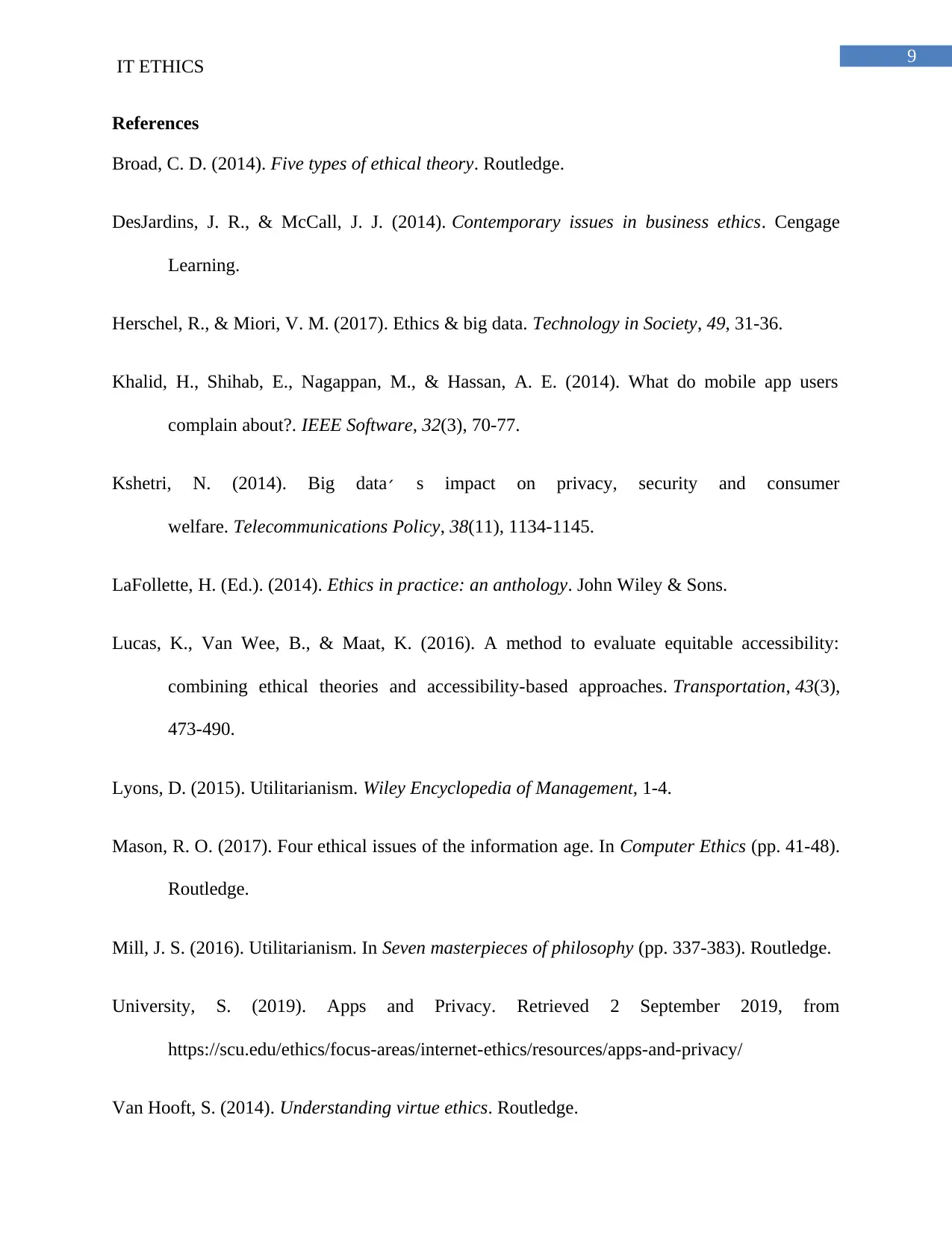
9
IT ETHICS
References
Broad, C. D. (2014). Five types of ethical theory. Routledge.
DesJardins, J. R., & McCall, J. J. (2014). Contemporary issues in business ethics. Cengage
Learning.
Herschel, R., & Miori, V. M. (2017). Ethics & big data. Technology in Society, 49, 31-36.
Khalid, H., Shihab, E., Nagappan, M., & Hassan, A. E. (2014). What do mobile app users
complain about?. IEEE Software, 32(3), 70-77.
Kshetri, N. (2014). Big data׳ s impact on privacy, security and consumer
welfare. Telecommunications Policy, 38(11), 1134-1145.
LaFollette, H. (Ed.). (2014). Ethics in practice: an anthology. John Wiley & Sons.
Lucas, K., Van Wee, B., & Maat, K. (2016). A method to evaluate equitable accessibility:
combining ethical theories and accessibility-based approaches. Transportation, 43(3),
473-490.
Lyons, D. (2015). Utilitarianism. Wiley Encyclopedia of Management, 1-4.
Mason, R. O. (2017). Four ethical issues of the information age. In Computer Ethics (pp. 41-48).
Routledge.
Mill, J. S. (2016). Utilitarianism. In Seven masterpieces of philosophy (pp. 337-383). Routledge.
University, S. (2019). Apps and Privacy. Retrieved 2 September 2019, from
https://scu.edu/ethics/focus-areas/internet-ethics/resources/apps-and-privacy/
Van Hooft, S. (2014). Understanding virtue ethics. Routledge.
IT ETHICS
References
Broad, C. D. (2014). Five types of ethical theory. Routledge.
DesJardins, J. R., & McCall, J. J. (2014). Contemporary issues in business ethics. Cengage
Learning.
Herschel, R., & Miori, V. M. (2017). Ethics & big data. Technology in Society, 49, 31-36.
Khalid, H., Shihab, E., Nagappan, M., & Hassan, A. E. (2014). What do mobile app users
complain about?. IEEE Software, 32(3), 70-77.
Kshetri, N. (2014). Big data׳ s impact on privacy, security and consumer
welfare. Telecommunications Policy, 38(11), 1134-1145.
LaFollette, H. (Ed.). (2014). Ethics in practice: an anthology. John Wiley & Sons.
Lucas, K., Van Wee, B., & Maat, K. (2016). A method to evaluate equitable accessibility:
combining ethical theories and accessibility-based approaches. Transportation, 43(3),
473-490.
Lyons, D. (2015). Utilitarianism. Wiley Encyclopedia of Management, 1-4.
Mason, R. O. (2017). Four ethical issues of the information age. In Computer Ethics (pp. 41-48).
Routledge.
Mill, J. S. (2016). Utilitarianism. In Seven masterpieces of philosophy (pp. 337-383). Routledge.
University, S. (2019). Apps and Privacy. Retrieved 2 September 2019, from
https://scu.edu/ethics/focus-areas/internet-ethics/resources/apps-and-privacy/
Van Hooft, S. (2014). Understanding virtue ethics. Routledge.
1 out of 10
Related Documents
Your All-in-One AI-Powered Toolkit for Academic Success.
+13062052269
info@desklib.com
Available 24*7 on WhatsApp / Email
![[object Object]](/_next/static/media/star-bottom.7253800d.svg)
Unlock your academic potential
Copyright © 2020–2026 A2Z Services. All Rights Reserved. Developed and managed by ZUCOL.




